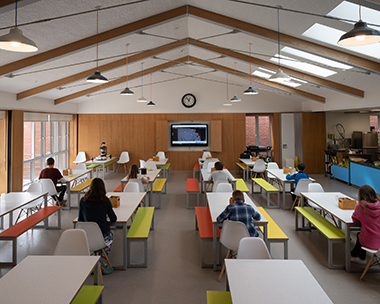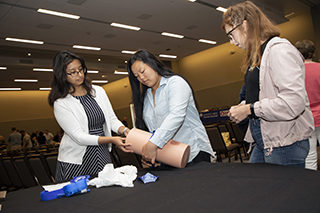Second Annual School Safety and Preparedness Summit to Focus on COVID-19 Challenges for Educators

Leaders from UAlbany’s School of Education and College of Emergency Preparedness, Homeland Security and Cybersecurity are gearing up to host the second annual Safe, Prepared and Effective Learning Environments (SPELE) summit.
Three virtual sessions, held through next month, will focus on school preparedness and response to COVID-19. Dates and topics include:
- July 23 (9 a.m. to noon): How to safely reopen your school buildings, campuses and classrooms. Registration link.
- Aug. 6 (9 a.m. to noon): Phantom Menace: Keeping Students and Schools Safe in Cyberspace. Registration link.
- Aug. 13 (9 a.m. to noon): Pandemic Related Psychological First Aid and Recovery for Students and Staff; led by SUNY New Paltz’s Institute for Disaster Mental Health. Registration link.
Following Up on Last Year's Success
The inaugural summit — a sold-out two-day event with more than 150 in attendance — was launched last August at the Albany Capital Center in response to recent increases in violence at schools and on college campuses. It featured interactive workshops to help those in the Capital Region with a vested interest in protecting children and young adults gain hands-on experience with emergency preparation, response and recovery.
In a follow-up program, Comptroller Thomas DiNapoli, who was a keynote at the inaugural summit, hosted a statewide roundtable at UAlbany. The event brought together stakeholders to strategize on how to collectively move work from the summit forward into the schools.
UAlbany is New York’s oldest public teachers college and a national leader in the area of emergency preparedness and school safety. The upcoming virtual summit, offered at no cost to attendees, will feature experts from across the University, along with local K-12 leaders and industry partners.
Student Safety through Community

“School safety is a community-wide responsibility and we are excited to continue to work with colleagues throughout the Capital Region to collectively improve the well-being and security of all students,” said Christy Smith, an assistant dean in the School of Education, who directs the SPELE initiative.
“The University at Albany is committed to making our schools and communities as safe as possible,” said CEHC Dean Robert Griffin. “Our goal through this summit, whether we are addressing increases in violence on school and college campuses, safely reopening during a global pandemic, managing a cybersecurity attack, or responding to new or different threats, is to tap into UAlbany’s wide range of expertise to help make learning environments safer and more effective. We are bringing together a renowned group of first responders, educators, researchers, and industry partners.”
“The depth of expertise in education and emergency preparedness at UAlbany position the University to be a hub of this important work and we look forward to continuing to partner with colleagues in the K-12 and law enforcement communities to advance research and professional development in the area of school safety and its impact on student learning,” said School of Education Dean Jason Lane. “We’re particularly indebted to the statewide leadership of Comptroller DiNapoli on this important issue and for convening critical stakeholders to advance a collective agenda for positive change.”
“We’re proud to work with our colleagues to turn academic and practitioner insights into solutions for our schools,” said Jayson Kratoville, interim director of CEHC’s National Center for Security and Preparedness. “COVID-19 has highlighted the central role education plays in our communities’ economic and social resilience — we need to make sure that when schools can reopen, they are empowered with strategies to stay open.”
Community leaders, educators (teachers, faculty, staff and administrators), first responders (emergency managers, police, firefighters, EMTs), mental health professionals, parents/guardians and social workers are encouraged to attend the upcoming sessions.
Northeastern Regional Information Center is sponsoring the summit. More details available here.




